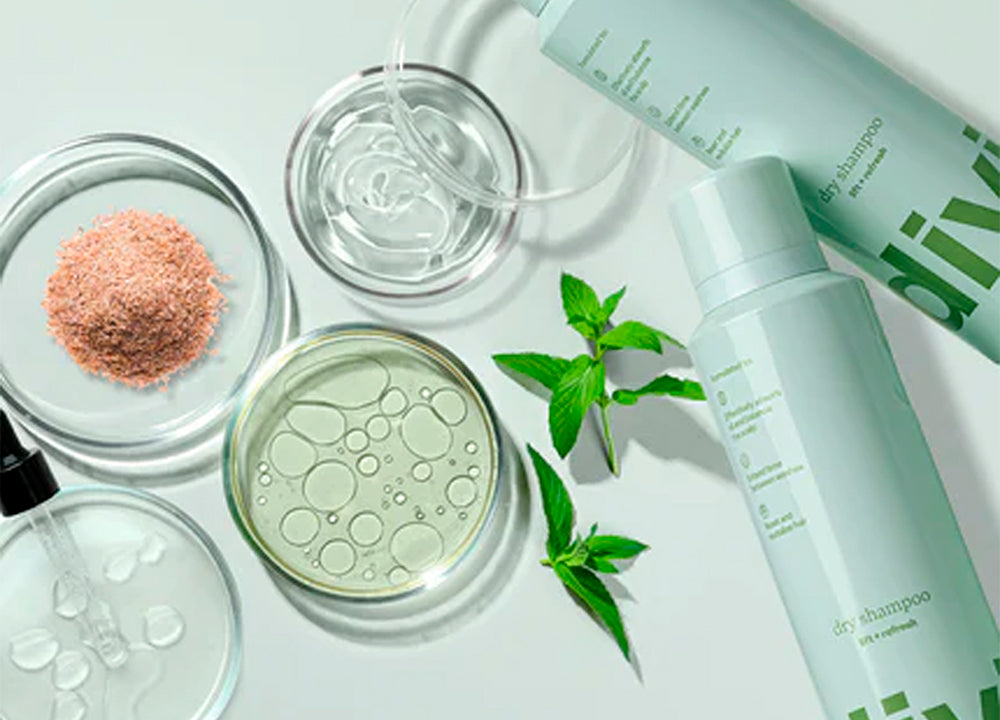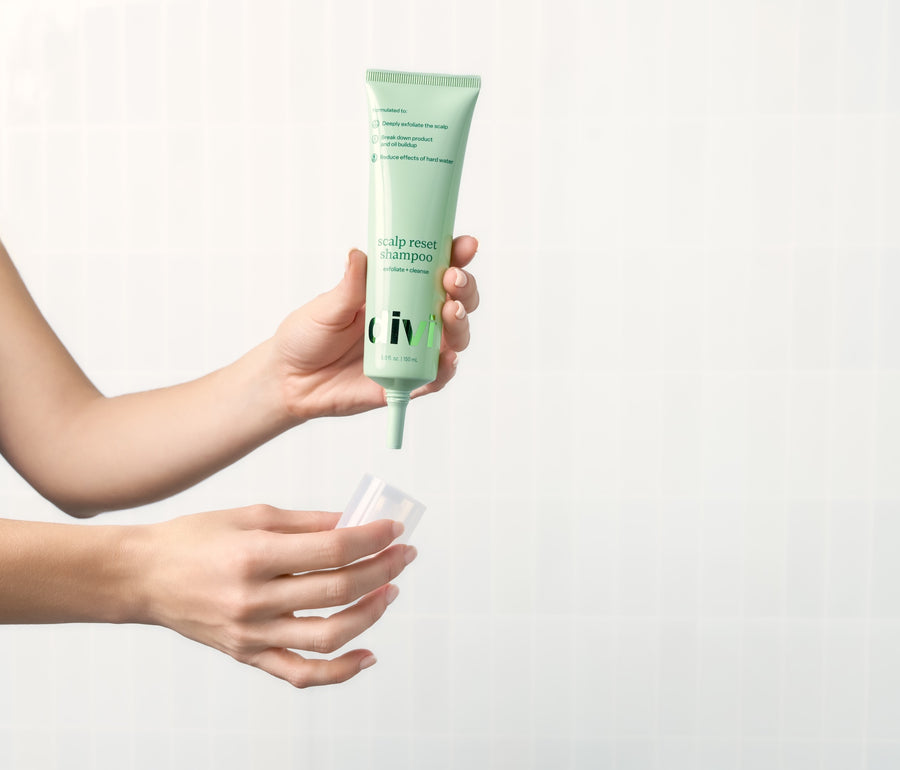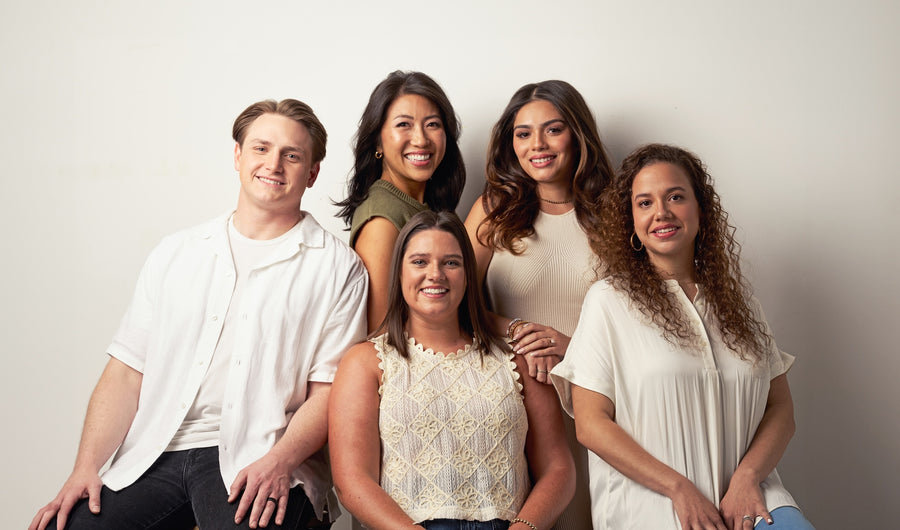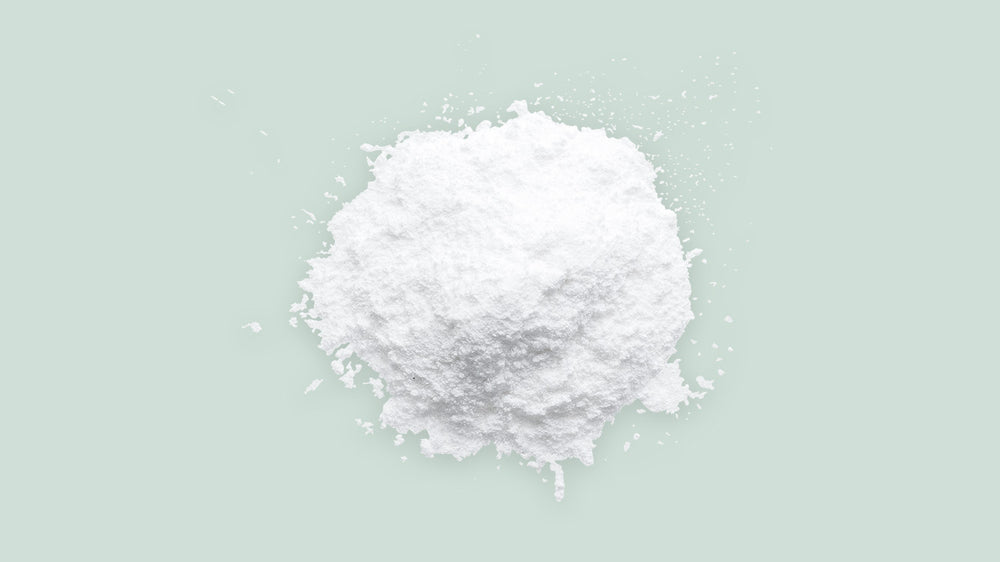Research supports the efficacy of ascorbic acid for hair growth and health. At Divi, we understand how much you care about your hair, so our proprietary formula contains ascorbic acid as one of the proven ingredients used to promote thicker, healthier and fuller hair.
Divi’s Scalp Serum features a clean, lightweight, residue-free and fast-absorbing formula supporting natural cell renewal and targeting hair health.
Continue reading to learn more about ascorbic acid and what this ingredient in our Scalp Serum can do for your scalp and hair health.
What is Ascorbic Acid?
Ascorbic acid (aka L-ascorbic acid) is another name for vitamin C, an essential nutrient in charge of many bodily functions. Vitamin C is an antioxidant that removes from your body harmful free radicals causing cellular damage as you age. Free radicals can contribute to life-threatening conditions like cancer, heart disease and other illnesses.
Most notably, vitamin C helps your body produce collagen, a vital protein necessary for building every cell in your body. Vitamin C helps form cartilage, muscles, bones, blood vessels and hair follicles. This water-soluble vitamin nutrient helps your body fight infections while supporting cell growth and regeneration.
Your body doesn't naturally produce vitamin C, so you must consume it in other forms, both topically and orally, to avoid a vitamin C deficiency. You can find vitamin C in citrus fruits, potatoes, tomatoes, peppers, berries and many supplements or serums, like Divi’s Scalp Serum. Vitamin C is essential to health and beauty-related regimens, as it naturally boosts collagen and fights scalp-related conditions with its antioxidant properties.
Why Does Hair Loss Happen?
To learn how ascorbic acid supports hair health, you should first understand what causes hair loss. Hair loss varies between men and women, and causes include:
- Surgeries or procedures
- Iron deficiencies
- Aging
- Eating disorders
- Thyroid disease
- Fungal infections
- Scalp inflammation (lichen planus, lichen planopilaris, folliculitis, etc.)
- Telogen effluvium (trauma-related hair shedding)
- Loose anagen syndrome (loose hair roots causing excess shedding)
- Autoimmune diseases and disorders, like alopecia
Hair Loss in Women
Aside from the conditions above, women also frequently experience hair loss from hormonal changes. Female-pattern baldness typically occurs from aging, genetics and hormones. You might commonly experience hormonal hair loss after childbirth or during menopause.
Hair Loss in Men
Men also experience hormone-related hair loss. Most commonly, the sex hormone dihydrotestosterone (DHT), which affects hair growth cycles, can shorten or shrink hair, causing hair loss in aging men. Men may also experience male-pattern balding that begins as receding hairlines or thinning spots and progresses over time.
Signs of Unhealthy Hair
Even if you don't have a pre-existing condition, you may not have top-notch hair health. Many scalp and hair symptoms signify underlying problems. If you have any of the following symptoms or conditions, you may suffer from poor hair health:
- Scalp itchiness, dryness and flakiness (dandruff)
- Scalp eczema (seborrheic dermatitis)
- Psoriasis
- Contact dermatitis
- Sensitive skin
- Hair frizziness
- Excess damage and split ends
- Hair dullness
- Excessive scalp greasiness
How Does Ascorbic Acid Promote Hair Health?
Ascorbic acid promotes hair health in various ways, though most importantly, it helps your body absorb iron. Iron deficiencies can result in chronic hair loss or stunted growth. Topical vitamin C improves iron levels, removes free radicals, improves collagen production, strengthens hair, prevents hair loss, and promotes growth.
Removes Free Radicals
Vitamin C is a powerful antioxidant capable of ridding your body of harmful free radicals that damage hair follicle cells. Free radicals naturally increase as you age, resulting in oxidative stress capable of contributing to hair damage and loss. Vitamin C delays this process, promoting hair health.
Improves Collagen Productions
Collagen is a structural protein that accounts for 30% of the proteins in your body. It’s responsible for forming connective tissues, including your skin, nails and hair. Your body needs vitamin C to form the triple helix of amino acids that form proteins like collagen. With increased vitamin C, you can boost collagen production, ultimately improving scalp skin health and hair follicle growth.
Strengthens Hair
Hair breakage can happen for many reasons and typically results in thinner, duller and frizzier hair.
Collagen is vital for strong hair. The protein’s antioxidant properties offer photoprotection, anti-aging and anti-pigmentation effects. By boosting collagen levels, vitamin C inherently increases hair strength and durability.
Prevents Follicle Shrinkage and Hair Loss
DHT, the male sex hormone, can cause hair follicle shrinkage and loss. Men experience increased DHT levels as they age, resulting in gradual hair loss. Vitamin C suppresses DHT formation, preventing follicle shrinkage and hair loss.
Promotes Hair Growth
Vitamin C helps your body absorb iron, a key player in hair growth. Iron creates red blood cell proteins called hemoglobin. Hemoglobin transports oxygen between your cells, allowing your body to repair itself and continue growing.
The cells in your scalp and hair follicles need oxygen-rich blood to grow. Vitamin C improves your hair’s environment by increasing iron levels, which boosts your hemoglobin production, ultimately promoting hair growth.
Because vitamin C increases collagen levels, it can also support hair regrowth. Hair regrowth refers to the treatment required after permanent hair loss conditions. Vitamin C, combined with the other ingredients in Divi’s Scalp Serum, may help replenish hair in balding areas.
Can Ascorbic Acid Improve Hair and Scalp Conditions?
Many people suffer from underlying conditions that cause hair loss. Ascorbic acid can improve hair health and growth rates while treating symptoms related to various underlying conditions. Although vitamin C can’t cure many underlying diseases, it can offer hair and scalp-related nourishment.
Scalp Itching, Dryness and Dandruff
Scalp itchiness, dryness and dandruff are uncomfortable symptoms indicating poor moisture and potential infections. Vitamin C’s antiviral and immune system regulation properties help with dry, itchy scalps. Ascorbic acid for hair growth also has collagen-boosting abilities that help improve the skin’s appearance by improving dryness.
Seborrheic Dermatitis
Seborrheic dermatitis, or eczema, is a skin condition that commonly affects the scalp, causing dry, scaly patches, redness, inflammation and dandruff. Vitamin C's anti-inflammatory and immune-boosting properties help fight inflammation related to seborrheic dermatitis so you can heal faster.
Scalp Sensitivity
A sensitive scalp is a common condition causing excessive scalp tenderness, irritation, itching, numbing, throbbing, inflammation and more. The pain typically begins with the hair follicle bulbs, which are the scalp's primary nerve-ending source.
Vitamin C strengthens hair follicles and scalp and improves sensitivity by reducing oxidative stress. Oxidative stress responses occur from excess free radicals, which ascorbic acid can combat using its antioxidant properties. Vitamin C can also reduce inflammation associated with the condition.
Male-Pattern Hair Loss
Male-pattern baldness is responsible for 95% of all male hair loss cases. Many factors, including genetics, aging and hormones, may contribute to male-pattern baldness. High oxidative stress, reduced iron absorption rates and increased DHT levels frequently cause premature hair loss.
Vitamin C helps your body fight free radical damage (oxidative stress), absorb more iron and control DHT formations. This triple-threat approach can reduce hair loss and graying in aging men.
Thinning Hair
The most common causes of thinning hair in women include iron deficiencies and thyroid imbalances. Iron deficiencies can cause anemia-related diffuse thinning, a chronic hair loss condition, while thyroid disease can alter your hormones, affecting hair growth. Your body needs vitamin C to absorb iron properly.
Alopecia
Alopecia is a medical term that means “baldness” and that comes in many forms, typically resulting in immune system attacks on hair follicles that cause hair loss in sudden patches. Vitamin C can help fight the following forms of alopecia:
- Alopecia areata: Like other forms of hair loss, alopecia areata may occur as a result of iron deficiencies, so improving your iron absorption rates with vitamin C can help you continue growing strong, healthy hair.
- Traction alopecia: Traction alopecia occurs from excessive force pulling on the hair follicles, typically from tight hairstyles. Vitamin C can reduce the oxidative stress related to this condition, enabling you to reverse its effects sooner.
- Central centrifugal cicatricial alopecia: Central centrifugal cicatricial alopecia causes permanent hair loss patches. Vitamin C's collagen-boosting properties and nutritional enhancements can support hair regrowth.
- Frontal fibrosing alopecia: Frontal fibrosing alopecia typically appears as a receding hairline or scarring. Vitamin C can improve hair growth and reduce receding effects.
- Telogen effluvium: Telogen effluvium is a hair-shedding disorder that commonly causes alopecia. Sudden traumatic effects can trigger this condition by spiking oxidative stress levels. Vitamin C combats free radicals and helps your body heal faster from traumatic effects.
- Loose anagen syndrome: Loose anagen syndrome is a non-scarring alopecia that causes increased hair loss from poorly anchored follicles. Ascorbic acid for hair growth strengthens the connective tissues in your scalp by increasing collagen production, which can improve loose anagen syndrome hair loss.
Female-Pattern Baldness
Female-pattern baldness can occur due to aging, hormone imbalance, genetics or poor nutrition.
Vitamin C has been shown to help control free radical-related female-pattern hair loss. This ingredient improves iron absorption, which has been shown to combat oxidative stress and facilitate optimal hair growth environments.
Nutritional Deficiencies
Scalp and hair follicle malnutrition can cause poor hair health, breakage, dullness and increased shedding. Vitamin C improves collagen and iron levels, offering a better growth environment while neutralizing free radicals. Since your body doesn't naturally produce vitamin C, you must consume it in other forms to obtain these necessary nutrients.
Postnatal Hair Loss
Childbirth frequently reduces estrogen levels in new mothers, causing excessive hair loss. Vitamin C improves collagen levels and can nourish your body with the amino acids it needs to build keratin. Keratin is the protein in charge of hair growth and strength.
Thyroid Disease
Thyroid disease is a dysfunction causing hormonal imbalances that may lead to hair loss and other symptoms. Clinical research shows that vitamin C can improve T4, T3 and thyroid-stimulating hormone (TSH) abnormalities and concentrations. As a result, anyone suffering from thyroid disease can enjoy more balanced hormones by taking vitamin C, which can improve hair loss effects.
Post-Menopause Hair Loss
During and after menopause, estrogen and progesterone levels typically decrease and DHT androgen levels increase, causing hair loss, follicle shrinkage and thinning. Menopausal hair loss may sometimes be temporary, although it can take time for hair to regrow. Vitamin C decreases your body's sensitivity to DHT, improves collagen production, fights free radicals, and stimulates hair growth, ultimately reducing the hair loss effects of menopause.
Applying Ascorbic Acid through Divi’s Scalp Serum
While you could take vitamin C supplements or eat extra citrus fruits, you wouldn't get to enjoy the direct results of topical applications. A topical supplement provides the most potent, fast-absorbing and targeted ascorbic acid effects. Divi’s Scalp Serum includes ascorbic acid for hair growth, plus a comprehensive formula packed with other science-proven ingredients for promoting thick, healthy and strong hair.
Applying ascorbic acid to your scalp with Divi’s Scalp Serum is easy. Simply use ¾ of a dropper across your scalp or affected areas once daily before massaging it into your scalp. We recommend continuing this routine for at least three months to achieve the desired results.
Does Ascorbic Acid Have Negative Side Effects?
No, ascorbic acid doesn't cause adverse side effects. Topical application of vitamin C via Divi’s Scalp Serum supports natural cell renewal and our formula has been dermatologically tested. If you do experience any irritation, we recommend discontinuing use and consulting your doctor to see if you have any aversions to the other ingredients.
Try Divi’s Scalp Serum for Fuller, Healthier Hair
Ample research supports the effectiveness of ascorbic acid for hair growth. The ingredient targets scalp health and hair growth by improving iron absorption rates, boosting collagen levels, and neutralizing free radicals.
For maximum results, try Divi’s Scalp Serum featuring a fast-absorbing, vegan, clean, residue-free and lightweight formula. Our innovative blend targets the root causes of hair health, supporting a nutrient-rich hair follicle environment stimulating natural cell renewal and hair growth.
You can purchase Divi’s Scalp Serum on our website to begin taking your scalp’s health and the future of your hair’s appearance into your hands. Contact our team to learn more about the hair loss-fighting properties of our Scalp Serum and ascorbic acid!











































 Scalp Serum
Scalp Serum
 Scalp Reset Shampoo
Scalp Reset Shampoo
 Dry Shampoo
Dry Shampoo
 Best Sellers Bundle
Best Sellers Bundle
 Weekly Reset Duo
Weekly Reset Duo
 Root Touch Up
Root Touch Up
 Strand Plumping Styling Cream
Strand Plumping Styling Cream
 Root Reset Duo
Root Reset Duo
 3-in-1 Leave-In Conditioner
3-in-1 Leave-In Conditioner
 Air Dry Cream
Air Dry Cream
 Wash Day Essentials
Wash Day Essentials
 Frizz-Fighting Trio
Frizz-Fighting Trio
 Home & Away Dry Shampoo Bundle
Home & Away Dry Shampoo Bundle
 Volumizing Shampoo & Conditioner
Volumizing Shampoo & Conditioner
 Jumbo Volumizing Shampoo & Conditioner
Jumbo Volumizing Shampoo & Conditioner
 Volumizing Starter Bundle
Volumizing Starter Bundle
 Major Volume Bundle
Major Volume Bundle
 Volume Rescue Trio
Volume Rescue Trio
 Hydrating Shampoo & Conditioner
Hydrating Shampoo & Conditioner
 Whipped Repair Treatment Mask
Whipped Repair Treatment Mask
 Hydrating Starter Bundle
Hydrating Starter Bundle
 Hydration Heroes
Hydration Heroes
 Travel-Sized Volume Duo
Travel-Sized Volume Duo
 Travel-Sized Hydrating Duo
Travel-Sized Hydrating Duo
 Divi's Discovery Set
Divi's Discovery Set
